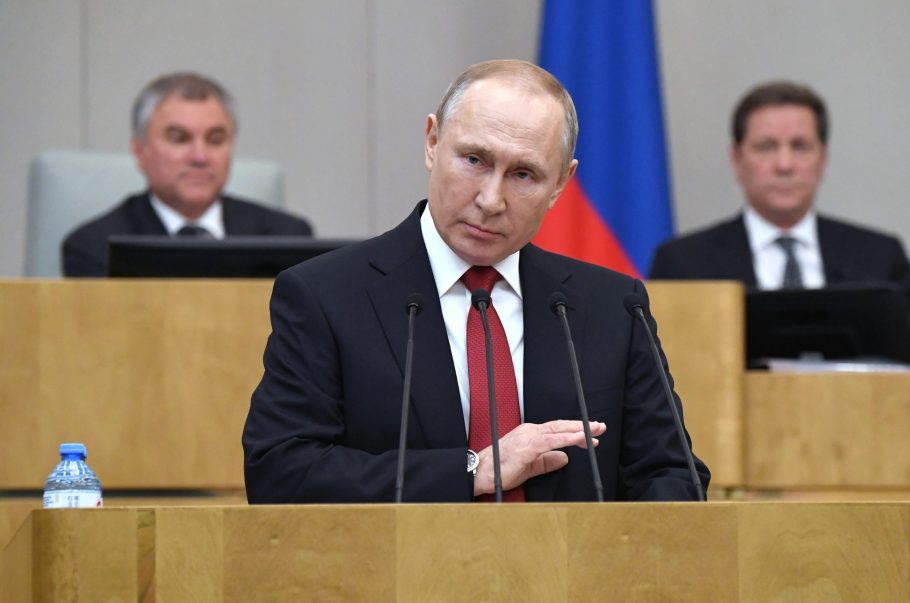
By Kseniya Kirillova, for Byline Times
Kseniya Kirillova analyses the new laws which enshrine the Russian President’s future power, control of the past and attempts to mobilise Russian expansion.
As expected, the Russian State Duma and Federation Council approved amendments to the Constitution on 11 March.
The revision of the supreme law began on 15 January, with the first package of amendments proposed by Vladimir Putin. In the weeks which have followed, Russian deputies, officials and pro-Kremlin social activists started showcasing their creativity by producing their own versions of the vision of what should be enshrined in the Constitution.
In the process, it occasionally seemed that the goal was to turn Russia’s supreme law into a collection of jokes. At first, the group working on the amendments proposed that the position of President should be renamed “Supreme Ruler”. It also suggested securing Russia’s status as a “victorious power” in World War Two.
Patriarch Kirill (Gundyaev) decided to go one better and called for the mention of God to be included in the Russian Constitution. The head of the Foundation for the Protection of National Values, Alexander Malkevich, proposed introducing a law granting Moscow “the right to use any force to protect the lives and property of its citizens abroad”.
In the end, the final text of the amendments was formulated and submitted to the State Duma to be voted on. Many experts have already noted that constitutional reform gives Putin the opportunity to “nullify” his previous presidential terms and remain in power after 2024. Another option could be a formal change of his position while maintaining the basic levers of governing the country, as well as providing himself with guarantees of immunity even after he leaves office.
Expansion
Even in the January version of the document, an amendment of Article 79 of the Constitution was added which read:
“Decisions of interstate bodies adopted on the basis of their interpretation of the international treaties of the Russian Federation which are contrary to the Constitution of the Russian Federation shall not be enforced in the Russian Federation”.
According to the Russian political analyst Elena Galkina, this amendment is not about the decisions of the European Court of Human Rights (ECHR) and other issues related to human rights, but primarily about decisions related to the annexation of Crimea and the possible alienation of other territories in the future.
“The Kremlin wants to show that regardless of the decisions of any international authorities and courts, it will consider the peninsula a part of Russia,” Galkina observes.
She also notes that the wording of the amendments to Article 81 of the Constitution, which stipulates requirements for a candidate for the presidency, indicates that the Kremlin is not excluding the possibility of official annexation of other territories. The new version of the amendment reads:
“The requirement that a candidate for the post of President of the Russian Federation cannot have citizenship of a foreign state does not apply to citizens of the Russian Federation who previously had citizenship of a state that was annexed or part of which was annexed by the Russian Federation in accordance with the federal constitutional law”.
“But what prevented the Russian authorities from openly referring to the Crimea and Sevastopol?” Galkina asks. “Most likely, in this case, they proclaim the principle itself, allowing the possibility of further incorporation of new states and parts of states into Russia.”
In the new amendments, a clause was added “preventing calls to alienate the territories of Russia and actions aimed at alienation” which would seem to confirm Galkina’s conclusions.
Consolidation of Ideology
Despite the formal absence of a state ideology in Russia, the new Putin Constitution enshrines the only idea that really exists in the country: to have faith in Russia’s greatness based on a cult of the idealised past.
According to the new version of the Constitution, Russia is “united by a thousand-year history, preserving the memory of the ancestors who transmitted to us their ideals and faith in God”.
It also declares the Russian Federation to be the successor of the USSR when it comes to membership in international organisations and treaties.
It is forbidden to “diminish the significance of the people’s deeds in the defence of the Fatherland” and the right and obligation of the state to “protect the historical truth” is established. The support of Russian compatriots living abroad has also become part of the Constitution – without mentioning any “force” in their support, however.
Clearly, Putin is flirting with the two main groups of Russian patriots: Orthodox conservatives and supporters of the USSR. The paradox of his rule is that, for decades, Russian propaganda has cultivated the ideology of both of these groups and tried to reconcile them. But now both communist and monarchist sentiments are increasingly becoming manifestations of opposition.
With the growth of corruption, geopolitical tensions and a decline in the standard of living of most of the Russian population, the extremely idealised image of the past – particularly that of Joseph Stalin – serves, not in support of the current Government in the eyes of most Russian people, but rather as a rebuke.
By pushing God into the Constitution, emphasising continuity with the USSR and the inviolability of the cult of the Great Patriotic War, Putin is again trying to regain the trust of both groups and increase his approval ratings – which have been shaken in recent years, both in the eyes of ‘radical patriots’ and ordinary citizens. The emphasis on marriage as a “union of a man and a woman” and the promise of social income guarantees serve the same purpose.
There is a logic to Putin’s appeal to populism to increase his approval ratings. According to a Levada Centre poll, 47% of Russians believe that presidential amendments to the Constitution are being made in the interests of Vladimir Putin himself, but almost the same percentage believes that they will ultimately serve the “common good”. Only 27% of respondents expressed a desire to see Putin as President after 2024 and almost as many would prefer to see him retire.
A New Mobilisation
Introducing ideological and populist norms into the Constitution may also be another attempt to mobilise a population tired of the war in Ukraine which, combined with a fixed course towards further expansion, is an extremely dangerous sign.
While tracking Russian propaganda, it is difficult to ignore the fact that both left and right ideologues have been put into service in order to promote mobilisation. Evgeny Fedorov, a conspiracy theorist from the United Russia party, told RT that the amendments are only the first step on the road to liberation from foreign occupation and the restoration of the USSR.
Meanwhile, the authors of the extreme right-wing Orthodox portal Russian People’s Line enthusiastically proclaimed that “the great January counter-revolution, the need for which the National Conservatives have been proclaiming for a long time, has come to pass!”
The manifestation of attempts at such mobilisation can be seen in the creation of an extremist ideological political party, ‘For Truth’, led by Zakhar Prilepin, the former “major” of militants from the so-called ‘Donetsk People’s Republic’ in eastern Ukraine. Prilepin has called his new organisation a “militia” and, while lamenting that he had not created it before, has declared war on external and internal liberalism.
“Expansion – diplomatic, cultural, political, linguistic, and in extreme cases, military – is the norm,” Prilepin declared. “We have one meaning of the concept of civilisation: everything that contributes to the preservation, strengthening and expansion of Russian civilisation is civilised.” He also demanded that the break-away eastern Ukrainian statelet of Donbass be made “twice as big” and described reconciliation with the West as a “surrender”.
In practice, as the results of opinion polls show, this mobilisation has failed. According to the latest Levada Centre survey, the percentage of people trusting Russian television has fallen from 79% to 52%. However, Putin – correctly described by the German Chancellor Angela Merkel as someone who lives “in his own reality” – does not seem to have reliable information about the mood of his own people.
In any event, the attempts to enshrine the Kremlin’s aggressive policy in the Constitution is a very alarming sign – both for Russia’s neighbours and the West as a whole.
By Kseniya Kirillova, for Byline Times




